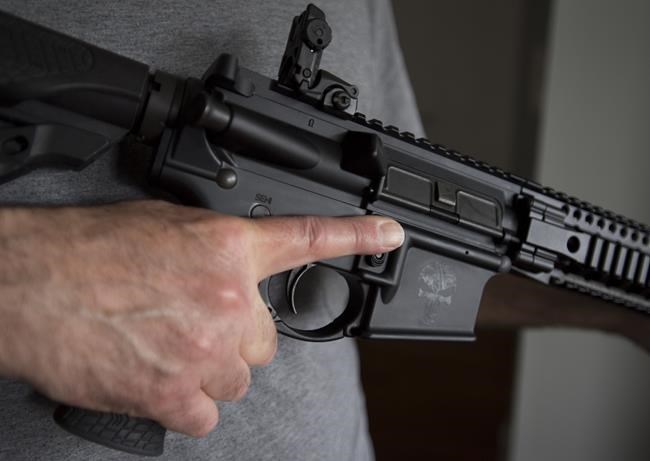
A restricted gun licence holder holds an AR-15 at his home in Langley, B.C., Friday, May 1, 2020. Canadian police chiefs are urging the federal government not to rely on resource-strapped police forces to carry out a planned gun buyback. THE CANADIAN PRESS/Jonathan Hayward
Republished October 27, 2022 - 1:21 PM
Original Publication Date October 27, 2022 - 11:21 AM
OTTAWA - Canada's police chiefs are urging the federal government not to rely on resource-strapped police forces to carry out a planned gun buyback.
The Liberal government banned some 1,500 models and variants of firearms, including the AR-15 and Ruger Mini-14, through an order-in-council in May 2020 on the grounds they have no place in hunting or sport shooting.
A proposed buyback program would require owners to either sell these firearms to the government or have them rendered inoperable at federal expense.
The future program would complement various other gun-control measures in legislation being studied by the House of Commons public safety committee.
Regina Police Chief Evan Bray, appearing Thursday at the committee on behalf of the Canadian Association of Chiefs of Police, said the organization awaits details on the implementation of a buyback program and the implications for police.
Bray said the buyback will be an administrative process — not a policing issue — involving a massive amount of work.
He suggested that another organization, or courier or mail services, be enlisted to help people turn in their firearms, allowing police to focus on lawbreakers as well as border integrity, smuggling and trafficking.
"Our front line officers — it doesn't matter where you're talking in Canada — are strapped. They're being overstretched. Their communities' expectations are much higher than what our officers are able to deliver," Bray said.
"And sadly, we are delivering that work, but it's at the expense of our officers because of the drain on them and their mental health. And so I think this added process needs to be diverted somewhere else rather than using police resources, if at all possible."
The RCMP is "operating at minimal levels already," said Brian Sauvé, president of the National Police Federation, which represents Mounties.
There are challenges in recruiting and retaining officers, he told the Commons committee.
"Every time that we increase the mandate of police officers on the street, there has to be something that gives," Sauvé said. "And is that going to mean that we don't respond to that mental health call, the person in crisis in the middle of the street, because police officers are now tied up going to pick up guns that are no longer legal to possess?"
Sauvé expressed concern the task of collecting the banned firearms will fall to police. "Without sustained resources, something has to fall off the plate."
Bray suggested that if police are given the job of administering the firearm buyback effort, officers will not be able to fully carry it out because they are too busy responding to urgent calls from the public.
In turn, Bray said, he worries that could mean many gun owners will be considered criminals once the amnesty period ends because their guns have not been forfeited through the buyback.
"So if it's not given a high enough priority, then I think it will have a counter-effect, and it will cause us problems on the back end as well."
This report by The Canadian Press was first published Oct. 27, 2022.
News from © The Canadian Press, 2022